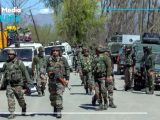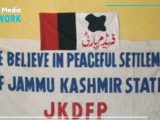
Indian Police Seize Books in IIOJK: A New Assault on Religious Freedom
February 15, 2025In a bold crackdown, Indian police have confiscated hundreds of books tied to prominent Kashmiri leaders, sparking widespread condemnation from all sphares for undermining religious freedom in the region.
Kashmiri political leaders have expressed strong condemnation after the Indian police recently seized hundreds of books linked to Jamaat-e-Islami in Srinagar. This move is being seen as a direct attack on religious freedom in Indian Illegally Occupied Jammu and Kashmir (IIOJK). The police, during a raid in the city, confiscated over 650 books authored by renowned Islamic scholar and Jamaat-e-Islami founder, Abul A’la Maududi, along with writings of the iconic pro-freedom leader, Syed Ali Gilani.
The police justified the raid by claiming that the books were being distributed secretly by banned organizations. Jamaat-e-Islami, along with several other pro-freedom groups, has been banned in IIOJK. The seizure of these books, alongside restrictions on mosques and the continued suppression of political and religious groups, highlights the growing efforts of the BJP-led Indian government to suppress dissent in the region.
The crackdown on literature has raised alarms among Kashmiris and human rights advocates. Senior National Conference leader and Indian parliamentarian, Ruhullah Mehdi, condemned the police raid, calling it an alarming violation of religious freedoms. Mehdi took to X (formerly Twitter) to voice his concern, stating, “This is blatant state oppression and intolerance. Will the state now dictate what Kashmiris read, learn, and believe? This is an unacceptable overreach.”
His remarks underline the fears that these actions are not only a political maneuver but an attempt to control the religious and intellectual freedoms of the people in the region. The raid has added to the growing tension in Kashmir, where numerous measures are being implemented to restrict freedom of expression and religious practices, especially among Muslims.
The ongoing interference in Kashmiri religious affairs has raised serious questions about the Indian government’s approach to managing the region. Many see this as a systematic attempt to erase Kashmiri cultural and religious identity, with state control extending to personal beliefs and intellectual freedom.
The recent book seizure in Srinagar has sparked a wider debate about the limits of state power and the suppression of religious and political voices in IIOJK. The crackdown is part of a broader strategy by the Indian government to stifle dissent and assert control over every aspect of life in the region, leaving Kashmiris questioning their fundamental rights under occupation.

